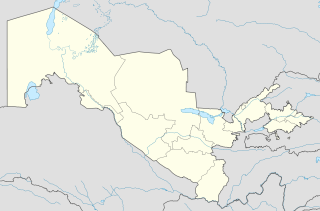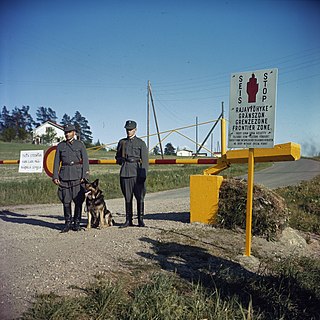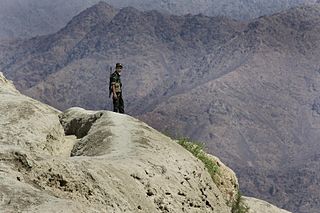
The Armed Forces of the Kyrgyz Republic is the national military of Kyrgyzstan. It was originally formed from the former Soviet forces of the Turkestan Military District stationed in newly independent Kyrgyzstan. It consists of the Ground Forces, the Air Force and the National Guard. Affiliated security forces to the armed forces included the Internal Troops, the State Committee for National Security and the Border Troops.

Kyrgyzstan, officially the Kyrgyz Republic, is a landlocked country in eastern Central Asia, lying in the Tian Shan and Pamir mountain ranges. Bishkek is the capital and largest city. Kyrgyzstan is bordered by Kazakhstan to the north, Uzbekistan to the west, Tajikistan to the south, and China to the east and southeast. Ethnic Kyrgyz make up the majority of the country's over 7 million people, followed by significant minorities of Uzbeks and Russians.

Uzbekistan is divided into 12 regions, 1 autonomous republic, and 1 independent city.

Batken Region is a region (oblus) of Kyrgyzstan. Its capital is Batken. It is bounded on the east by Osh Region, on the south, west and north by Tajikistan, and on the northeast by Uzbekistan. The northern part of the region is part of the flat, agricultural Ferghana Valley. The land rises southward to the mountains on the southern border: the Alay Mountains in the east, and the Turkestan Range in the west. Its total area is 17,048 km2 (6,582 sq mi). The resident population of the region was 548,247 as of January 2021. The region has sizeable Uzbek and Tajik minorities.

Osh Region is a region of Kyrgyzstan. Its capital is Osh, which is not part of the region. It is bounded (clockwise) by Jalal-Abad Region, Naryn Region, China (Xinjiang), Tajikistan, Batken Region, and Uzbekistan. Its total area is 28,934 km2 (11,171 sq mi). The resident population of the region was 1,391,649 as of January 2021. The region has a sizeable Uzbek minority.

A border guard of a country is a national security agency that ensures border security. Some of the national border guard agencies also perform coast guard and rescue service duties.

Vorukh is a jamoat in northern Tajikistan that forms part of the city of Isfara in Sughd Region. As of 2022, the jamoat had a total population of 45.000.

Kyrgyzstan–Tajikistan relations refers to the bilateral diplomatic relations between Kyrgyzstan and Tajikistan. Both countries were a part of the Soviet Union. Kyrgyzstan–Tajikistan relations have been tense in recent years. The two countries fought in border clashes in 2021 and 2022. Refugees and antigovernment fighters in Tajikistan have crossed into Kyrgyzstan several times, even taking hostages.
Barak is a Kyrgyz village that is surrounded by the territory of Uzbekistan. Its de facto status as one of the world's 91 current international enclaves began in 1999. Administratively it is part of Kara-Suu District in Kyrgyzstan's Osh Region. It is encircled by the Andijan Region of Uzbekistan. Its population was 985 in 2021.

The Border Troops, also called the Border Service, is the border guard of Tajikistan. Functioning under the State Committee for National Security as part of the Armed Forces, the border guards are trained by the Organization for Security and Co-operation in Europe, along with the Afghan Border Police. A higher education college is located in the capital, Dushanbe, the Border Troops Academy, and a Border Troops Training Centre is located south of it, in the Rudaki District. The main control station of the border troops is the Border Management Center of the Main Border Guard Directorate of the SCNS.

The Ministry of Internal Affairs of Kyrgyzstan is a Government ministry that is connected to the Armed Forces of the Kyrgyz Republic. The organization also commands the Kyrgyz Frontier Force and administers the MVD Academy of Kyrgyzstan.

Taalaibek Baryktabasovich Omuraliev is a Kyrgyz major general and a former Minister of Defense of Kyrgyzstan. He also served briefly as the Chief of the General Staff twice.

Border Guards Day, also known as Frontier Guards Day is a former Soviet holiday that celebrates the border guard services of Russia and former Soviet republics. It is currently observed in Russia, Belarus, Kyrgyzstan, and Tajikistan on 28 May - the anniversary of the formation of the Soviet Border Troops in 1918.

The border between Kyrgyzstan and Tajikistan is 984 kilometres (611 mi) long and runs from the tripoint with Uzbekistan to the tripoint with China.

The State Committee for National Security (SCNS-KR) is the national agency responsible for intelligence on counter terrorism and organised crime in Kyrgyzstan. In carrying out this task, it carries out both preventive and investigative measures against organized terrorism and crime. The chairman of the UKMK is a military officer and a member of the Security Council of Kyrgyzstan. It is currently based on 70 Erkindik Street, Bishkek.
This is a list of individuals and events related to Tajikistan in 2021.

A three-day border conflict between Kyrgyzstan and Tajikistan began on 28 April 2021. The clashes stemmed from a long-running dispute over a water supply facility near the village of Kök-Tash. Tajik media raised some concern over military drills in Batken prior to the conflict.
This is a list of individuals and events related to Kyrgyzstan in 2022.

A series of sporadic border clashes resumed between Kyrgyzstan and Tajikistan on 27 January 2022, following a series of clashes in 2021 between the two countries.
This is a list of individuals and events related to Tajikistan in 2022.


















